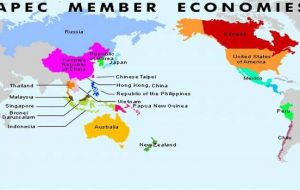MercoPress. South Atlantic News Agency
Australia will host 2007 APEC Summit
 APEC has 21 members
APEC has 21 members Asia-Pacific leaders will be asked to back practical ways for their nations to save energy when they meet at a regional summit in Sydney, Australian Prime Minister John Howard said on Monday.
Australia will host the Asia Pacific Economic Cooperation (APEC) summit from Sept. 8, and Howard has written to leaders of the group's 21 economies to put climate change at the top of the agenda. Howard said leaders would be asked to endorse a "long-term aspirational goal" for cutting greenhouse gas emissions blamed for global warming, and also look to practical ways of curbing emissions through improved energy efficiency. "The key task in Sydney is to give political direction to the shape of a future framework for climate change action that is truly global," Howard said in a speech outlining his APEC agenda. He said leaders were also keen to ensure the importance of forests and better land use, to create carbon sinks, would be included in any future agreements on climate change to replace the Kyoto Protocol, which runs out in 2012. The APEC summit includes the United States and Australia, which have refused to ratify the Kyoto Protocol setting greenhouse emissions targets for developed countries, as well as China and Indonesia, neither of which is bound by the climate shift pact. Howard said it was important for future international action on climate change to also allow countries like China and Indonesia to continue to grow. Indonesia wants to count emission cuts from preservation of its vast carbon-rich peatlands to be eligible for trade under any new agreement on climate change. Carbon savings from forests and peatlands were excluded from the first Kyoto Protocol. Howard has been a long-term critic of the Kyoto pact because it does not include major developing economies and unfairly punishes energy-rich countries like Australia, which is a a major coal exporter. "In short, it was a recipe for a structurally flawed and ineffective global response to climate change," Howard said. A draft leaders' declaration on climate change from the Sydney APEC meeting, obtained by Reuters, says leaders will agree on cuts to energy intensity by at least 25 percent on 2005 levels by 2030. Leaders would also agree to set up an Asia-Pacific Network for Energy Technology to strengthen and formalise energy research collaboration and coordination, it said - APEC was established in 1989 to further enhance economic growth and prosperity for the region and to strengthen the Asia-Pacific community. Asia-Pacific Economic Cooperation, or APEC, is the premier forum for facilitating economic growth, cooperation, trade and investment in the Asia-Pacific region. APEC is the only inter governmental grouping in the world operating on the basis of non-binding commitments, open dialogue and equal respect for the views of all participants. Unlike the WTO or other multilateral trade bodies, APEC has no treaty obligations required of its participants. Decisions made within APEC are reached by consensus and commitments are undertaken on a voluntary basis. APEC has 21 members - referred to as "Member Economies" - which account for more than a third of the world's population (2.6 billion people), approximately 60% o fworld GDP (US $19,254 billion) and about 47% of world trade. It also proudly represents the most economically dynamic region in the world having generated nearly 70% of global economic growth in its first 10 years. Its members are Australia, Brunei, Canada, China, Chile, Hong Kong, Indonesia, Japan, Malaysia, Mexico, New Zealand, Papua New Guinea, Peru, the Philippines, Russia, Singapore, South Korea, Taiwan, Thailand, the U.S. and Vietnam.




Top Comments
Disclaimer & comment rulesCommenting for this story is now closed.
If you have a Facebook account, become a fan and comment on our Facebook Page!